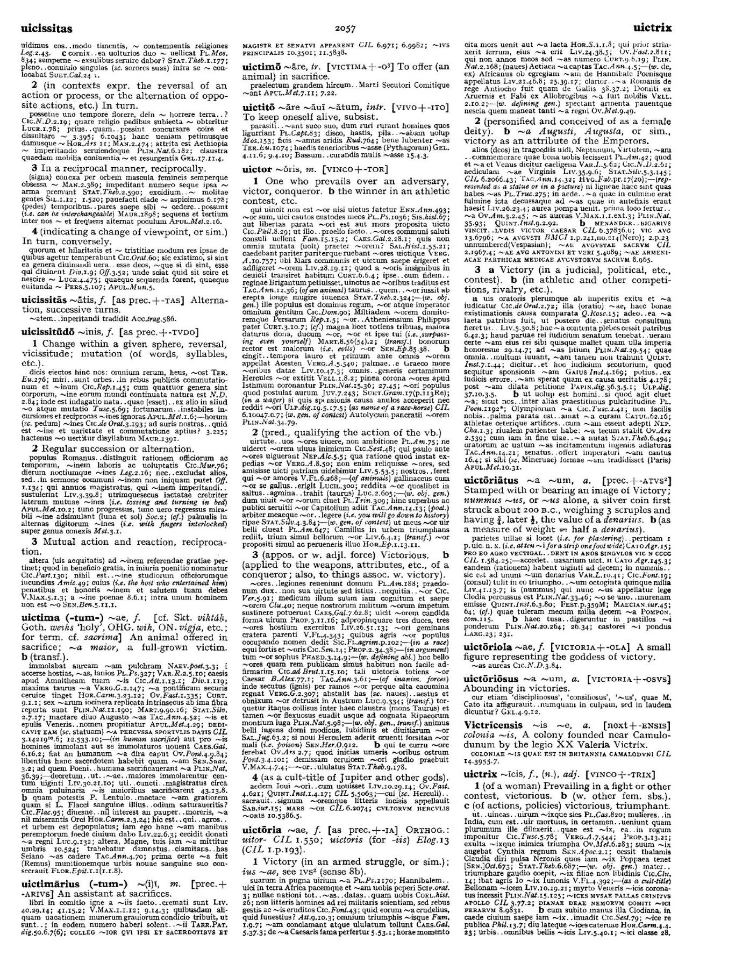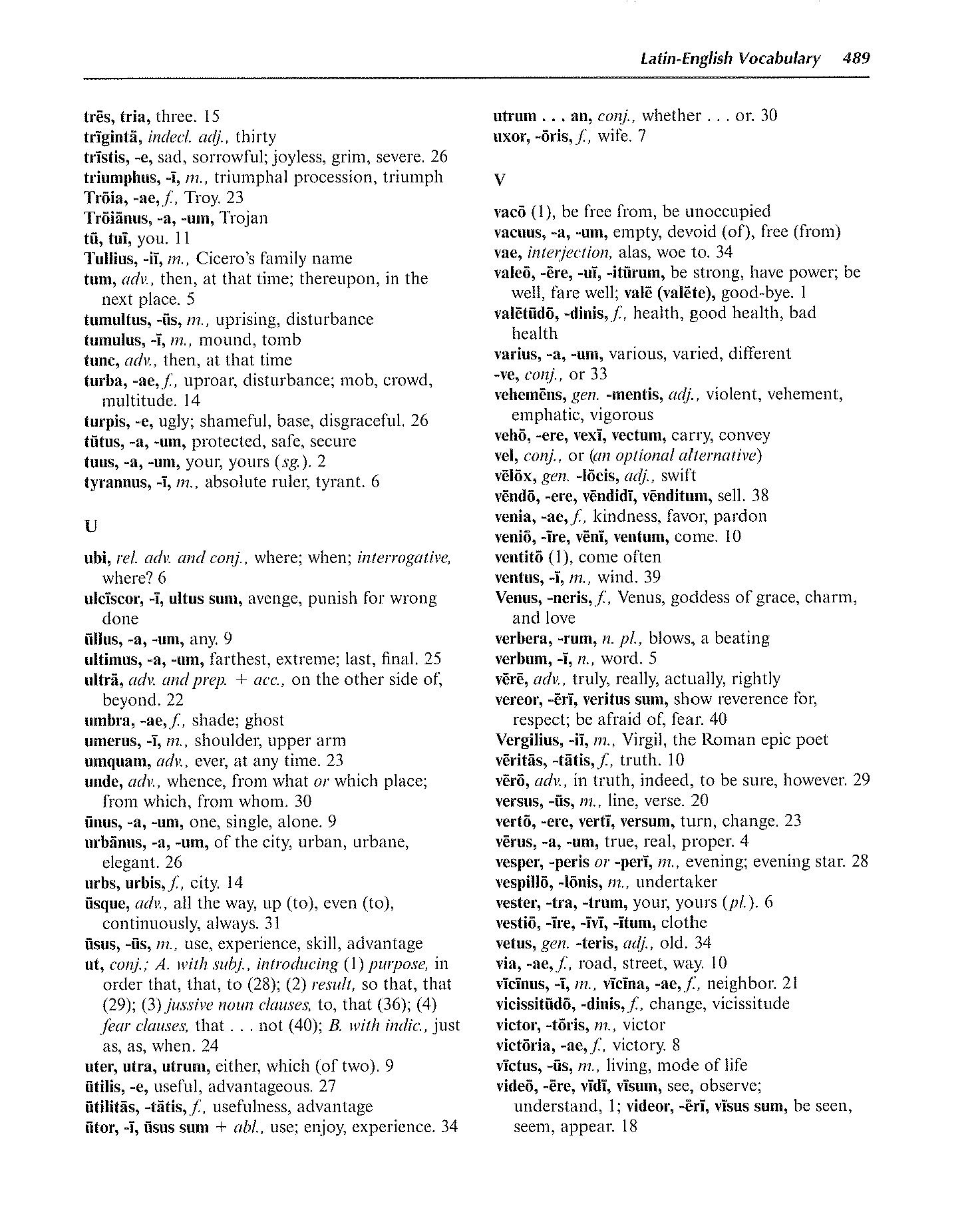
page_listing.tpl
page_subListingDetails.tpl
sub_listingDetails_style1.tpl
sub_listingDetails.title.tpl
victor victor
victor is a Latin Noun that primarily means victor.
Definitions for victor
Wheelock's Latin
Noun
- 1
victor
Oxford Latin Dictionary
Noun
- 1
One who prevails over an adversary, victor, conqueror, (b) the winner in an athletic contest, etc.
- 2
(pred., qualifying the action of the vb.).
- 3
(appos. or w. adjl. force) Victorious. (b) (applied to the weapons, attributes, etc., of a conqueror; also, to things assoc. w. victory).
Sentences with victor
Latin to English
Graecia capta ferum victorem cepit et artes intulit agresti Latio.Compare When Greece had been enslaved she made a slave of her rough conqueror, and introduced the arts into Latium, still rude.
Qui vicit non est victor nisi victus fatetur.Compare The victor is not truly a victor unless the vanguished admits it.
Omne bellum sumi facile, ceterum aegerrume desinere ... incipere cuivis, etiam ignavo licere, deponi, cum victores velint.Compare War is always easy to start, but very hard to end ... anyone, even a coward, may take up arms, but only the victors can say when they are to be laid down.
Resistens enim Cn. Pompeius, victor omnis gens, nunquam sui ille res publica deleo possum duco.Compare For as long as Cn. Pompey, the conqueror of every nation, was resisting, they thought that they could never destroy the republic.
Oppidanus urbs habeo, victor praemium in medium positus.Compare The townsmen had possession of the city, which was placed in the middle as the prize of the conquerors,
Victor timere quid potest? Quod non timet.Compare What can a victor fear? What he doth not fear.
Declension table for victor
Cactus2000
| Singular | Plural | |
| Nom. | victor | victōrēs |
| Gen. | victōris | victōrum |
| Dat. | victōrī | victōribus |
| Acc. | victōrem | victōrēs |
| Abl. | victōre | victōribus |
Data sources
Notes
- Definitions
- Frederick M. Wheelock, Wheelock's Latin, 6th ed., rev. Richard A. LaFleur (New York, NY: HarperCollins Publishers, 2005): 489.
- P. G. W. Glare, Oxford Latin Dictionary, Vols. 1-8 (Oxford: Clarendon Press, 1982): 2057.
- Word frequencies
- Christopher Francese, "Latin Core Vocabulary," Dickinson College Commentaries, last modified 2014, http://dcc.dickinson.edu.
- Paul B. Diederich, The Frequency of Latin Words and Their Endings, PhD diss., (Columbia University, 1939).
- Louis Delatte, Suzanne Govaerts, Joseph Denooz, and Etienne Evrard, Dictionnaire fréquentiel et index inverse de la langue latine [Frequency Dictionary and Inverse Index of the Latin Language] (Liège, Belgium: Laboratoire d'analyse statistique des langues anciennes de l'Université de Liège [L.A.S.L.A.], 1981): 122.
Bibliography
Allen, Joseph H. Allen and Greenough's New Latin Grammar for Schools and Colleges: Founded on Comparative Grammar. Edited by James B. Greenough, George L. Kittredge, Albert A. Howard, and Benjamin L. D'Ooge. Boston, MA: Ginn & Company, 1903.
Crystal, David. A Dictionary of Linguistics and Phonetics. 6th ed. Oxford, UK: Blackwell Publishing, 2008.
Delatte, Louis, Suzanne Govaerts, Joseph Denooz, and Etienne Evrard. Dictionnaire fréquentiel et index inverse de la langue latine [Frequency Dictionary and Inverse Index of the Latin Language]. Liège, Belgium: Laboratoire d'analyse statistique des langues anciennes de l'Université de Liège (L.A.S.L.A.), 1981.
Diederich, Paul B. The Frequency of Latin Words and Their Endings. PhD diss., Columbia University, 1939.
Francese, Christopher. "Latin Core Vocabulary." Dickinson College Commentaries. Last modified 2014. http://dcc.dickinson.edu/latin-vocabulary-list.
Gildersleeve, Basil L., and Gonzales Lodge. Gildersleeve's Latin Grammar: Third Edition, Revised, and Enlarged. 3rd ed. London, England: Macmillan and Co., 1903.
Glare, Peter G.W. Oxford Latin Dictionary. Vols. 1-8. Oxford, England: Clarendon Press, 1982.
Krüger, Bernd. "Latin Conjugation Tables." Cactus2000. Accessed May 5, 2023. https://latin.cactus2000.de/index.en.php.
Pierson, Nick. "Sound of Text." Accessed October 26, 2019. https://soundoftext.com.
Wheelock, Frederick M. Wheelock's Latin. 6th ed. Revised by Richard A. LaFleur. New York, NY: HarperCollins Publishers, 2005.
Wiktionary Contributors. "Victionarium." Wikimedia Foundation, Inc. Updated March 18, 2019. https://la.wiktionary.org/wiki/Victionarium:Pagina_prima.
Citation
Chicago (17th ed.)
Allo Contributors. "victor, victōris (n.) - Latin Word Definition." Allo Latin Dictionary. Last modified . Accessed February 21, 2026. http://ancientlanguages.org/latin/dictionary/victor-victoris.
Entry created on . Last updated on .







